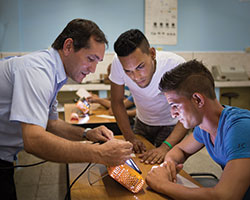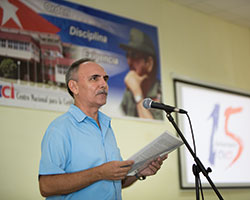In January, the world watched as barriers began to fall between Cuba and the biggest market in the Western world. More than 50 years after enacting trade embargoes against the Caribbean nation – the region’s largest with more than 11 million people – the U.S. began to relax restrictions and rebuild relations. Unprecedented this side of the Atlantic, the event was likened to the fall of “Latin America’s Berlin Wall” by one Colombian journalist.
NAIT has seen all of this unfold from the inside. This summer, the polytechnic celebrated the 15th anniversary of its partnership with the Cuban government. Chief among the projects resulting from this relationship is the Centro Nacional para la Certificacion Industrial (CNCI, or the national centre for industrial certification).
 Since 2000, NAIT instructors and staff have played a key role in the development of this small but vital institute near the city of Cienfuegos, on Cuba’s southern coast.
Since 2000, NAIT instructors and staff have played a key role in the development of this small but vital institute near the city of Cienfuegos, on Cuba’s southern coast.
It ranks among the country’s go-to resources for the skilled trades workforce required to boost domestic productivity and better prepare the country for the arrival of new partners looking to do business – partners who, in the days of the blockade, were inaccessible.
Overlooking the placid Bay of Cienfuegos, roughly 250 kilometres southeast of Havana, CNCI opened to offer electrical and instrumentation courses to about 80 students.
Brought into the project by what was then the Canadian International Development Agency (now Foreign Affairs, Trade and Development Canada), NAIT began donating equipment – everything from computers to metal lathes to instrumentation simulation panels – and introducing the expertise of instructors.
Over the years, the school – or la escuela, as it’s known locally – expanded to offer certification to supervisors, inspectors of welding and high-risk equipment such as pressure vessels, boilers, valves and piping. The curriculum matched what’s delivered in Alberta to meet international standards.
“NAIT has been essential in the development of CNCI, and has been able to transfer the know-how that we needed to develop the school and to give the best information to students,” says Moises Portell Suenga, instrumentation instructor and program head.
A stronger workforce – 11,000 skilled tradespersons from CNCI alone since it opened – is amassing.
Rafael Crisso Galan would agree. The Cuban instrumentation grad has become a kind of ambassador for the school, encouraging new students to enrol and contribute to an economy poised for growth.
“We can say that we have trained as technicians who have had a great impact in our industries,” he says. “Thanks to NAIT, this school is wonderful for the training of technicians and technical education in Cuba.”
The polytechnic has seen benefits from its relationship with Cuba as well. For more than 145 instructors and specialists, working at CNCI has provided unique professional development experiences.
“Our instructors are better when they return,” says George Andrews, vice-president external relations. They come back more resourceful and, owing to language differences, often as better communicators.
On the whole, working abroad – which NAIT has done in more than 60 countries – makes the polytechnic better, Andrews adds. Community and international economic development are “part of our corporate responsibility.”
He’s careful to point out, however, that this has been an equal partnership that has been supported by the Cuban work ethic, industriousness, pride and a belief in the power and importance of education.
All of this collaboration and innovation are laying the foundation for what may be a new era of growth for Cuba. On the ground, a stronger workforce – 11,000 skilled tradespersons from CNCI alone since it opened – is amassing.
 “The training offered at CNCI has great importance for Cuba, because it is specifically geared for those working in industry, in a wide range of trades and professions,” says Hugo Longoria del Blanco, CNCI director.
“The training offered at CNCI has great importance for Cuba, because it is specifically geared for those working in industry, in a wide range of trades and professions,” says Hugo Longoria del Blanco, CNCI director.
“And this training helps increase their skills [to] go back to their workplaces, their industries, and do their work with higher quality and safely increase their productivity.”
While much work remains to fully restore relations between Cuba and the U.S., that productivity represents new possibilities for Cubans with the world as a whole. CNCI, with NAIT’s help, has been part of the preparation to take advantage of emerging opportunities, whatever they may be.
“Education is important in Cuba to develop a skilled workforce in every industry,” says welding and metal trades instructor Gehovani del Valle Aguilera (pictured at top of page).
“Industry needs to have a trained, productive, skilled workforce to address the next steps ahead.”